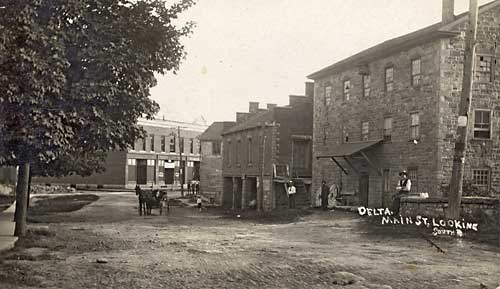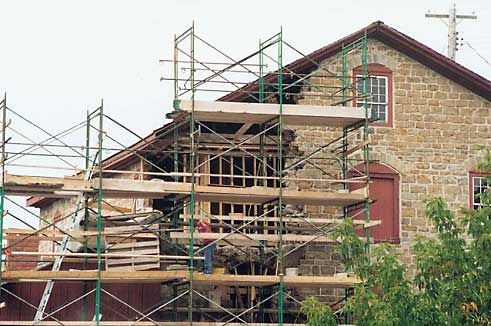 |

Old Stone Mill National Historic Site: Restoring a Legacy
by Natalie Wood, Assistant Curator
Who we are…
The Delta Mill Society is a non-profit organization that owns, manages and operates the Old Stone Mill National Historic Site, the Old Town Hall and the Mill Drive Shed in Delta, Ontario. The organization consists of a Board of Directors and a group of dedicated volunteers. In the summer months, the Delta Mill Society employs students to offer guided tours to the 8,000 to 10,000 visitors who come to the museums each year. The Delta Mill Society relies on donations, fundraising and grants to operate and to develop its exhibits and programs. The mill is open Victoria Day to Labour Day seven days a week 10-5, and by appointment in the off-season.
Our story…
Delta is a small rural village in South Eastern Ontario, located between Kingston, Smiths Falls and Brockville. It is part of the Frontenac Arch Biosphere Reserve. Delta is home to one of the longest running agricultural fairs in Ontario. It has long been a modest weekend destination for tourists and locals thanks to its location between Upper and Lower Beverley Lakes, which offer excellent fishing and recreation. Like many rural communities, though, Delta has suffered economically in the last quarter century, having lost its schools and its bank in the last decade along with several small businesses. Delta mostly attracts the retired crowd now, offering summer homes and cottages on the lakes and heritage homes along the main street. At the heart of this historic little village is an unmistakable landmark, the Old Stone Mill National Historic Site, a beautiful stone gristmill built in 1810, now operated as a museum by the Delta Mill Society.
Step back in time for a moment to consider the importance of a gristmill in a community without roads or business, and with only a few pioneers clearing newly settled land. Back to a time, two hundred years ago, when the mill was the heart of the community. Imagine the importance of such a structure with all that it represented for the people who relied on it: future, prosperity, security and even wealth. Abel Stevens built Delta’s first gristmill shortly after settlement in 1796. Steven’s mill was likely made of wood and probably burned down at least once before William Jones and Ira Schofield had the present-day stone structure built in 1810.
William Jones’ mill was one of pride and innovation. He installed the newest technology, adopting the automatic milling system from the 1795 publication, The Young Mill-Wright and Miller’s Guide, by Oliver Evans, in which, “No manual labour is required from the moment that the wheat is taken to the mill until it is converted to flour and ready to be packed.” Along with the unmatched technology, Jones’ mill structure was impressive. The stone mill used locally quarried stone and was over three stories in height (to accommodate the automatic milling system). Jones’ stone mill had Georgian-styled arched windows, which was an uncommon installation for an industrial building of that time. The construction of this mill in 1810 serviced a large area surrounding the village of Delta and provided for many other industries that sprang up in these early years, including a sawmill, carding mill and marble cutting mill in the stone building itself.
 |
| Main Street, Delta in 1905. Old Stone Mill in right foreground |
Between 1810 and 1963, nine mill owners left their mark on the Old Stone Mill, each adapting the mill to the economic challenges and the developing technologies of their time. Of particular note is Walter Denaut, who built (c.1860) the turbine shed addition to house water-powered turbines, which replaced the wooden waterwheel.
In 1963, the last mill owner, Hastings Steele deeded the mill to a group of trustees for $1, creating the Delta Mill Society and ensuring a future for the now aging mill. Steele had ceased operation of the gristmill in the early 1940s, running just the feed mill and sawmill. Those both closed in 1949 and Steele kept the mill open as a feed store until 1960. When the Delta Mill Society acquired the building in 1963 there were few working mill parts and the building had started to fall into disrepair. The trustees rose to the challenge and started fundraising for major restoration.
In 1970, the Old Stone Mill was designated a National Historic Site because of its early use of the automatic milling system and its unique Georgian architecture. It is the only stone gristmill in Canada to receive the status of National Historic Site. With this new title, the Delta Mill Society worked with the Ontario Ministry of Culture and other provincial and federal agencies to fund a building stabilization project in 1972-4. This project included general masonry repair, re-roofing with new cedar shakes, jacking of floors to level, replacement of windows, sash and glazing, and structural framing stabilization. The work during this period was not extensive, but did secure the building sufficiently for the Delta Mill Society to open the building as a museum in 1983.
In 1999 the Delta Mill Society undertook its most ambitious project. In conjunction with the Parks Canada National Cost-Sharing Program, a Trillium Grant and a great deal of community support, the Delta Mill Society pooled their resources to fund a one million dollar extensive restoration project. This project included further masonry repairs and the restoration of the flooring and its supports. The restoration was completed in 2004.
 |
| The mill undergoing restoration |
Since restoration, the Delta Mill Society’s staff and volunteers have been working on developing exhibits that interpret the mill’s machinery, history and legacy. Leading up to the mill's 200th anniversary in 2010, a wooden waterwheel was installed and correct period milling equipment was purchased. Then, in 2010, a pair of operating French burrstones were intalled and in October of that year the mill did its first millstone grinding of wheat in over 100 years.
Today the mill remains as a showcase of the pioneer development of eastern Ontario, a tangible reminder of our past.
|
 |
|
The Delta Mill Society
Box 172, Delta, Ontario K0E 1G0
Tel: 613-928-2584 (office)
Email: info@deltamill.org |
 |
|
 |

